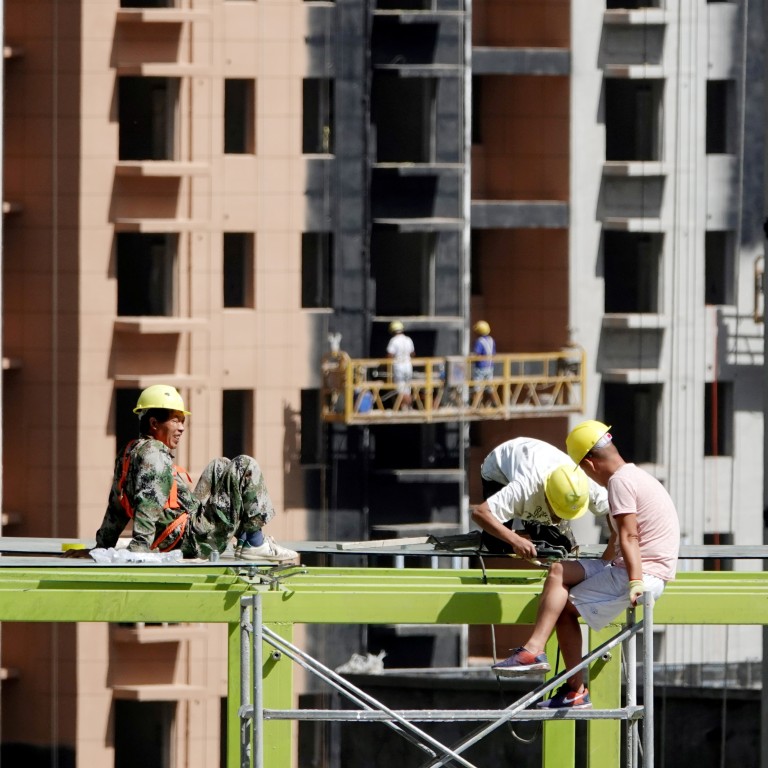
Small developers from China using Hong Kong equity market as launch pad to issue bonds
- Snubbed by local stock investors, small developers find themselves darlings in debt market
- Six mainland developers are on city’s IPO waiting list; at least two others are preparing to file
At least eight mainland developers have filed or plan to file for initial public offerings in Hong Kong – but they are actually eying the debt market, where they hope to entice investors with high yield offerings.
Most are small-cap property stocks, hardly the darlings of the equity market in Hong Kong. But their high-yield bond offerings – some at 9.1 per cent – can attract investors with high-risk appetite, according to interviews by the South China Morning Post with industry insiders and a review of historical data.
Six mainland developers (excluding property management firms) are on the Hong Kong stock exchange’s IPO waiting list, and at least two are preparing to file applications, according to sources.
This compared with six listings by mainland developers in all of 2018, which, combined, raised HK$11.4 billion (US$1.5 billion) in their IPOs.
With the exception of Zhongliang Holding Group, a relatively large developer with a national presence, all the others this year are regional small players that are not familiar even to most mainlanders. That raises questions about whether Hong Kong and global investors will embrace them and how much funds they can raise.
If the developers are concerned, they aren’t showing it.
“For those small-cap developers, the listing will help them to secure an offshore financing channel such as bond issuance and syndicated loans,” said Toni Ho, RHB Securities' head of Hong Kong and China Research. “Sometimes it is fixed-income investors who are more interested in their high-yield bonds, instead of their equities.”
Ryanben Capital, a consultancy that specialises in Hong Kong’s equity market, said in its research note that “whatever money they raised in IPO, even if prices sink below their debut price, does not bother these bosses. What matters is they secured a financing vehicle and can survive”.
Indeed, for mainland small developers, being listed is a “live-or-die” matter because years of property curbing policies on the mainland have left them few financing choices: Most bank loans, trust loans and private equities have shut doors to them since 2017. Meanwhile, there is little hope they can list in mainland stock markets. Only two developers have managed to secure the Chinese securities regulator’s approval since 2010, with a number of big developers stuck in a long logjam.
It is not unusual for Chinese small-cap developers to sell USD-denominated bonds after launching an IPO in Hong Kong. For example, Zhenro Properties raised US$499 million in its IPO last January, but it went on to sell several bonds worth $1.6 billion by March. A Zhenro’s $150 million 10.5 per cent bond in January was oversubscribed eight times. But its recent stock price barely changed from its debut price.
The popularity of bonds among yield-hungry investors contrasts starkly with small developers’ stock market performances.
Midea Real Estate, for example, had to peddle its under-subscribed equities to institutional investors after its October floating and just sold a quarter of quota to retail investors. Several small developers were similarly snubbed by retail investors last year.
A company does not have to be listed to issue bonds or syndicated loans. But it does help to convince institutional investors to buy, given public firms are subject to strict information disclosure imposed by the exchange, industry insiders said.
A high gearing ratio – a measure of capital to debt – is a major dampener in stock valuations.
Most upcoming mainland developers fall into this category, with net gearing ratios as high as more than 400 per cent. Bond investors do not necessarily care, instead zeroing in on whether companies’ cash flow could cover upcoming interest payments, said an executive with a Hong Kong-based securities who helps Chinese developers to list in Hong Kong.
These small developers’ high yield is a definitely pull: their median coupon in 2019 hit 9.1 per cent, versus 8.1 per cent offered by the top 30 developers, according to Bloomberg data. In the first four months of this yearalone, developers beyond the top 30 sold US$22.6 billion in USD bonds, which was 63 per cent of all sold in 2018 and 44 per cent higher than that of the top 30 then.




